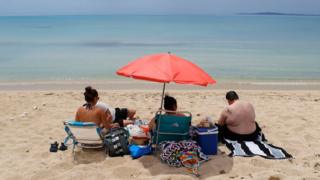No early return for UK tourists, says Spain
 Image copyright Reuters
Image copyright Reuters Spain’s tourism minister has cast doubt on the prospect of an early return by UK holidaymakers to Spanish beaches.
María Reyes Maroto said British coronavirus figures «still have to improve» before Spain could receive tourists from the UK.
Last week, the Spanish government said foreign visitors would no longer have to undergo a two-week quarantine from 1 July.
But Ms Reyes Maroto said tourist activity would be resumed «gradually».
«For Spain, it is very important that the first tourists are tourists who are in the same epidemiological situation as us, and that they are able to fly safely,» she said in a statement.
«Regarding the United Kingdom, there have been talks with tour operators but British data still have to improve, because it’s important to ensure that the person comes well and then returns well.»
The tourism minister said that as soon as conditions improved in the UK, Spain would be ready to receive British citizens «with the same hospitality as ever».
Spain normally attracts 80 million tourists a year, with the sector providing more than 12% of the country’s GDP.
Opening up the holiday market again before the summer season is over is seen as crucial to the Spanish economy.
However, just as Spain prepares to end its quarantine policy, the UK is set to impose a 14-day quarantine of its own for arrivals from 8 June, including returning holidaymakers.
That would mean that any tourists coming home after taking holidays in most foreign destinations would have to spend two weeks in self-isolation.
Other tourist destinations are also beginning to open up, with Greece announcing that flights to Athens and Thessaloniki airports will resume on 15 June – but only from those parts of Europe that have escaped the worst of the pandemic.
Other Greek airports are due to reopen on 1 July.
At the same time, tourism authorities in the Algarve region of Portugal have said its beaches will be open for tourists on 6 June, with flights resuming to the region’s international airport, Faro, from the UK and Ireland.
However, the UK Foreign and Commonwealth Office continues to advise against all non-essential foreign travel.

